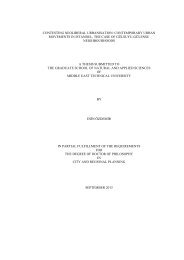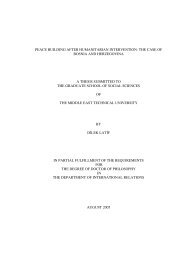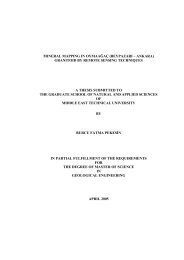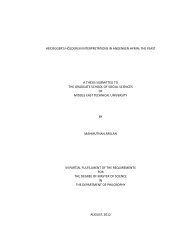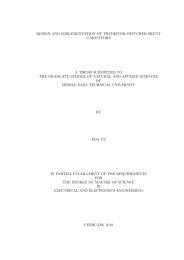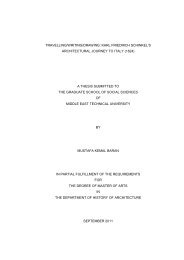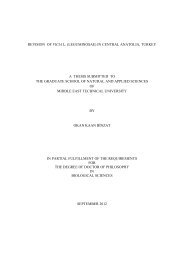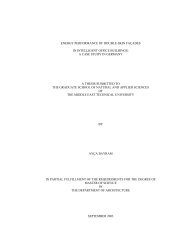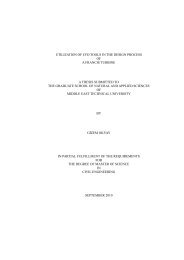View Original - Middle East Technical University
View Original - Middle East Technical University
View Original - Middle East Technical University
You also want an ePaper? Increase the reach of your titles
YUMPU automatically turns print PDFs into web optimized ePapers that Google loves.
tangential to mainstream economics(e.g. householding) in terms of standard or<br />
slightly adulterated forms of economic theory, myriad models of explorotary study on<br />
the milieux of economic routines(i.e. their embeddedness in interpersonal networks,<br />
organisational structures, or motleyed markets), and eclectic amalgam of explanatory<br />
models for economic phenomena and structures which are nevertheless<br />
methodologically froward against neoclassical paradigm(Zelizer 2002). Alas all this<br />
mid-level understandings of market structure, stylised injunctions on institutional<br />
effects, much ado about ‘high level of contingency’ in the design of economic<br />
institutions(Granovetter 1990:107), despite its heavily Polanyian infrastructure,<br />
merely afford a theory of ‘socialization lite’ mostly because economic sociology’s<br />
concept of economy as a modality of network-esque relations a la Granovetter is<br />
infinitely ‘thin’ without a concomitant and thorough analysis of otherwise structural<br />
circumstances/causalities(Peck 2005).<br />
Furthermore, the network paradigm still tendencially expatiates on the market as<br />
quizzically a presocial outremer around(or as external to) other more<br />
institutionalised/embedded/social segments of the economy. This is particularly so for<br />
those network sociologies, Williamsonian economics, and certain theories of<br />
governance that analyse social economy in terms of its manifold ‘degrees of<br />
marketness’; or for those heuristics which consider networks as a third form of<br />
economic organisational design next to market and hierarchy. This is an ineluctable<br />
contradiction of the sociology of markets-as-networks that would cussedly argue for<br />
more-or-less socialised economic forms alongside the price mechanism. Meanwhile<br />
the proviso that economy(/market) is intrinsically a social structure stagnates into an<br />
empirical comeuppance. Once more the market taboo withstands a thorough<br />
contumely and this time it even patrols the heights of sociological thinking. On the<br />
other hand, it is not exactly an arcanum that conceptual category of network is itself<br />
often a very marketised shorthand for market; economic sociologists in fact liberally<br />
equivocate about the nuances between networks and markets as abstractions.<br />
56



